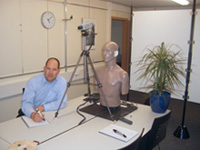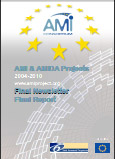AMI Multimedia Multimodal Meetings Database
The AMI Multimedia Multimodal Meetings Database is one of the Consortium’s most fundamental assets and a significant resource for the research and development community.
Design of meetings for the database
 The behavioral scientists designed a four party, four-part meeting sequence scenario and supporting materials. The scenario we used was a familiar one in manufacturing: the design of a new product. We specified well-defined roles for each party. Then we asked people to assume these roles during and between face-to-face meetings over the course of one day. In addition, about 20% of the corpus contains archives of meetings which do not follow the four part, four party scenario so that we can sample some less structured meeting types.
The behavioral scientists designed a four party, four-part meeting sequence scenario and supporting materials. The scenario we used was a familiar one in manufacturing: the design of a new product. We specified well-defined roles for each party. Then we asked people to assume these roles during and between face-to-face meetings over the course of one day. In addition, about 20% of the corpus contains archives of meetings which do not follow the four part, four party scenario so that we can sample some less structured meeting types.
Data capture in the Instrumented Meeting Room
AMI has set up and uses specially designed “instrumented” meeting rooms. These are self contained environments in which a meeting can be recorded. A meeting archive in this special setting is a set of all the data from 24 microphones and 7 video cameras.

The data sets now form the world’s largest and most complete corpus of meeting recordings with a similar set of participants, flow and goals. Then, using trained people as well as automated annotation systems, every video and audio segment for each participant’s perspective was annotated. For example, the words spoken by each participant were transcribed, the hand movements were defined by category and noted on a near frame-by-frame basis. Even participants’ facial expressions and their focus of attention (as indicated by the rotation of their head) were noted in a database. Think of all this information as the meta data of the meeting.
For additional information on the research approach, read this article about the AMI Meeting Database.
Please contact the AMI Scientific Director, for more information.


